09 Jun A Sweet Farewell: Virginia Webb’s final session at the Folk School
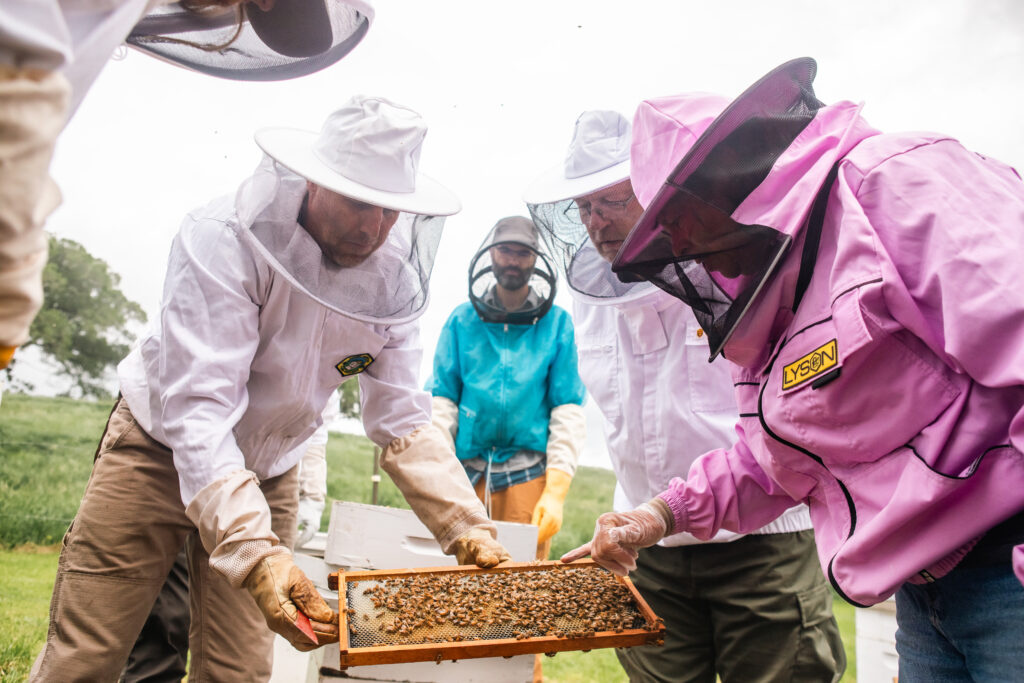
Clarkesville, GA based beekeeper Virginia Webb, in pink, and her Nature Studies class observe the bee colony. Webb advises her class on the health of the hive while they attempt to locate the queen bee.
As April concludes, spring flowers erupt from the soil, unfurling their petals upward to face the bright, nourishing light of the sun. Graceful butterflies delicately meander between campus trails as we flip our calendars to May.
All the buzz last week was the departure of beloved John C. Campbell Folk School instructor Virginia Webb of Clarkesville, who just completed her final Nature Studies session here on-campus. Webb is a highly regarded third-generation beekeeper, and the only individual to have received the “Best Honey in the World” award four times by the World Honey Show.
“The best honey you will ever taste is honey from your hive,” Webb said.
“We are ‘swarmed’ with gratitude for Virginia’s time spent on campus helping students earn their stripes; her departure is a bittersweet one,” said Executive Director Bethany Chaney.
Webb has achieved three Master Beekeeper’s certifications, offering her extensive knowledge on honeybees and their role in agriculture for over fifty years. She has participated in apiculture programs all over, teaching for the U.S. Department of Agriculture in Europe and the Caribbean.
Stephanie Anuju from Franklin, NC said Webb’s reputation and expertise encouraged her to sign up for the class.
“I took this course because I heard Virginia is a world-renowned teacher,” Anuju said. “I wanted to learn properly how to care for bees to add to my homestead.”
Webb’s session of “Beekeeping-How Sweet It Is” leads students on a hands-on workshop entailing how to build a beehive, harvest honey and manage an apiary year-round. She also shares her knowledge on controlling disease and mites, requeening a hive and setting up a pollen trap.
Nancy Simpson is Director of the South Carolina division of the Eastern Apicultural Society. Accompanying Webb as an instructor, Simpson advises students against standing in front of hives to avoid obstructing the insects’ high-speed exit. She explains this instinctive uniformity of a bee’s entrance and exit to the hive is precisely where the term “beeline,” originates.
Most people are interested in the class to benefit their garden, orchard, or homesteading efforts. Other folks have more personal reasons, such as Avery Sanderson of Hartsville, South Carolina. He is a wounded warrior veteran, who, “wanted to learn to introduce other vets to bees and homesteading.”
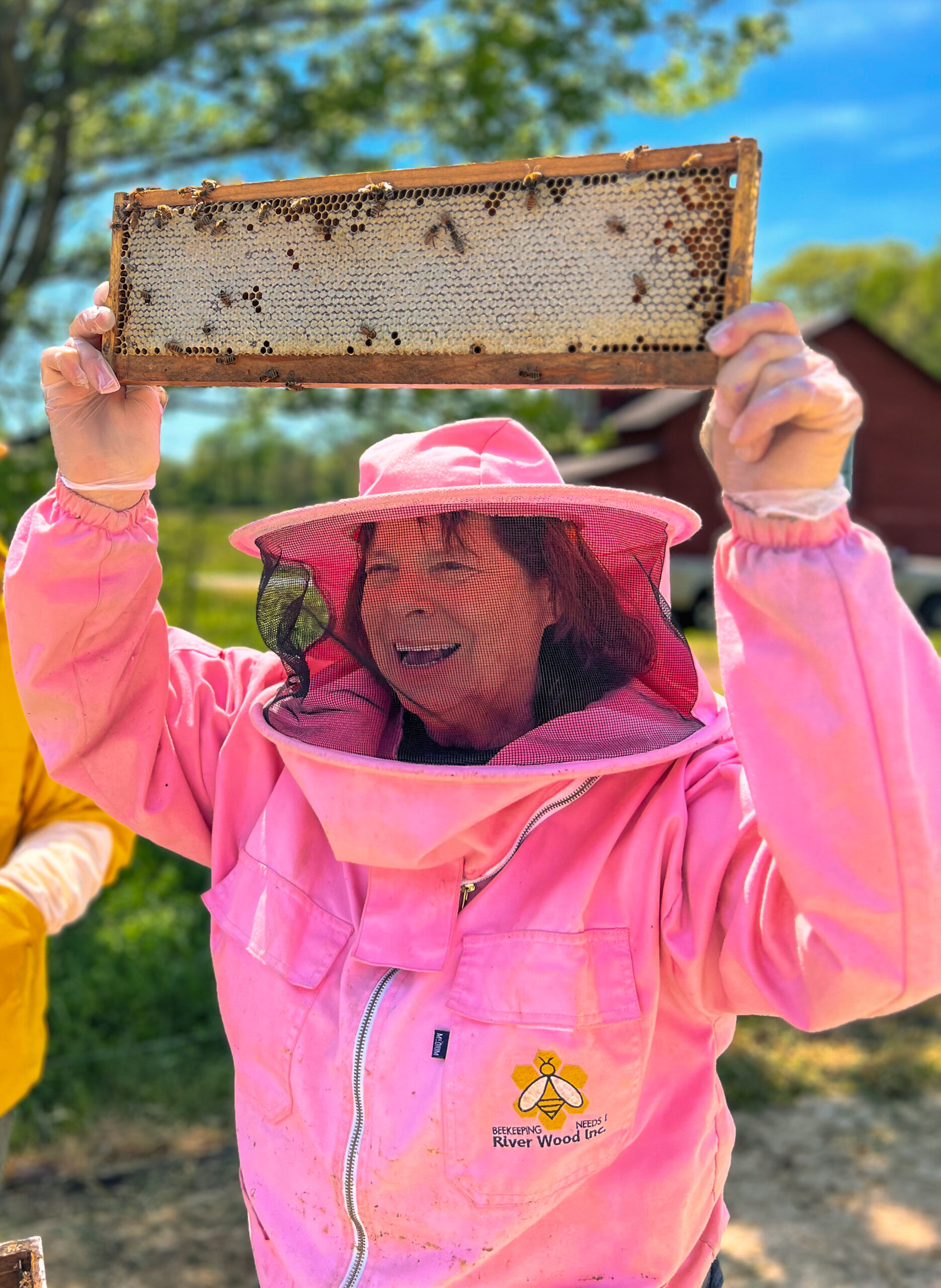
Clarkesville, GA based beekeeper Virginia Webb has taught beekeeping at the John C. Campbell Folk School for more than two decades. Webb holds a slatted rack of honey in the on-campus bee yard. Webb led a final group of students April 27-May 2.
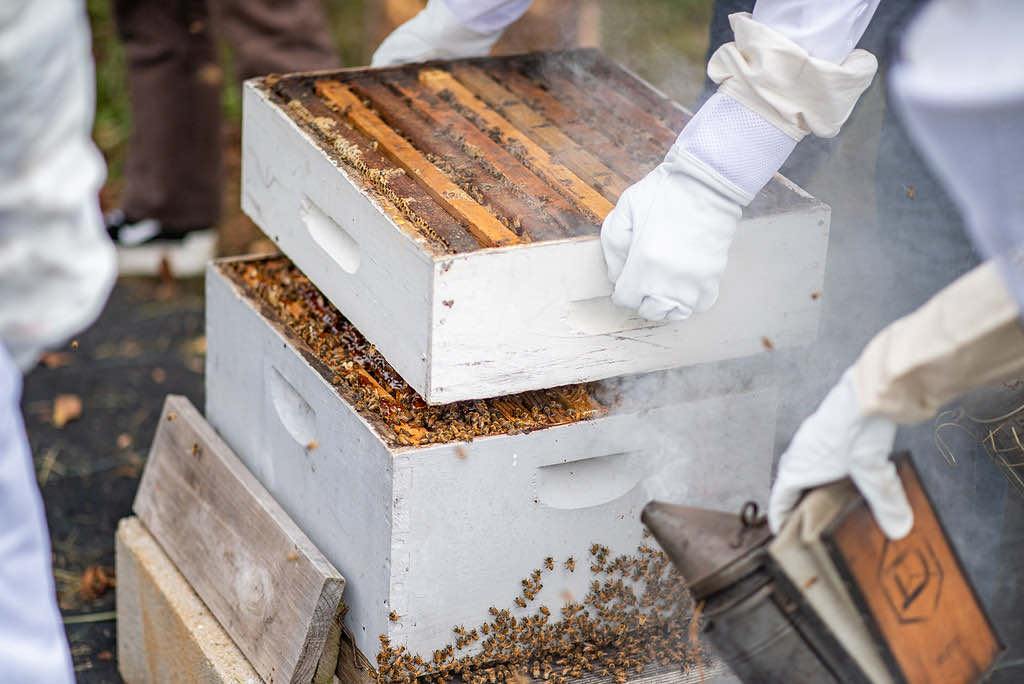
John C. Campbell Folk School Nature Studies students in the bee yard, apply smoke to reduce agitation to the colony during long-time instructor Virginia Webb’s final beekeeping class.
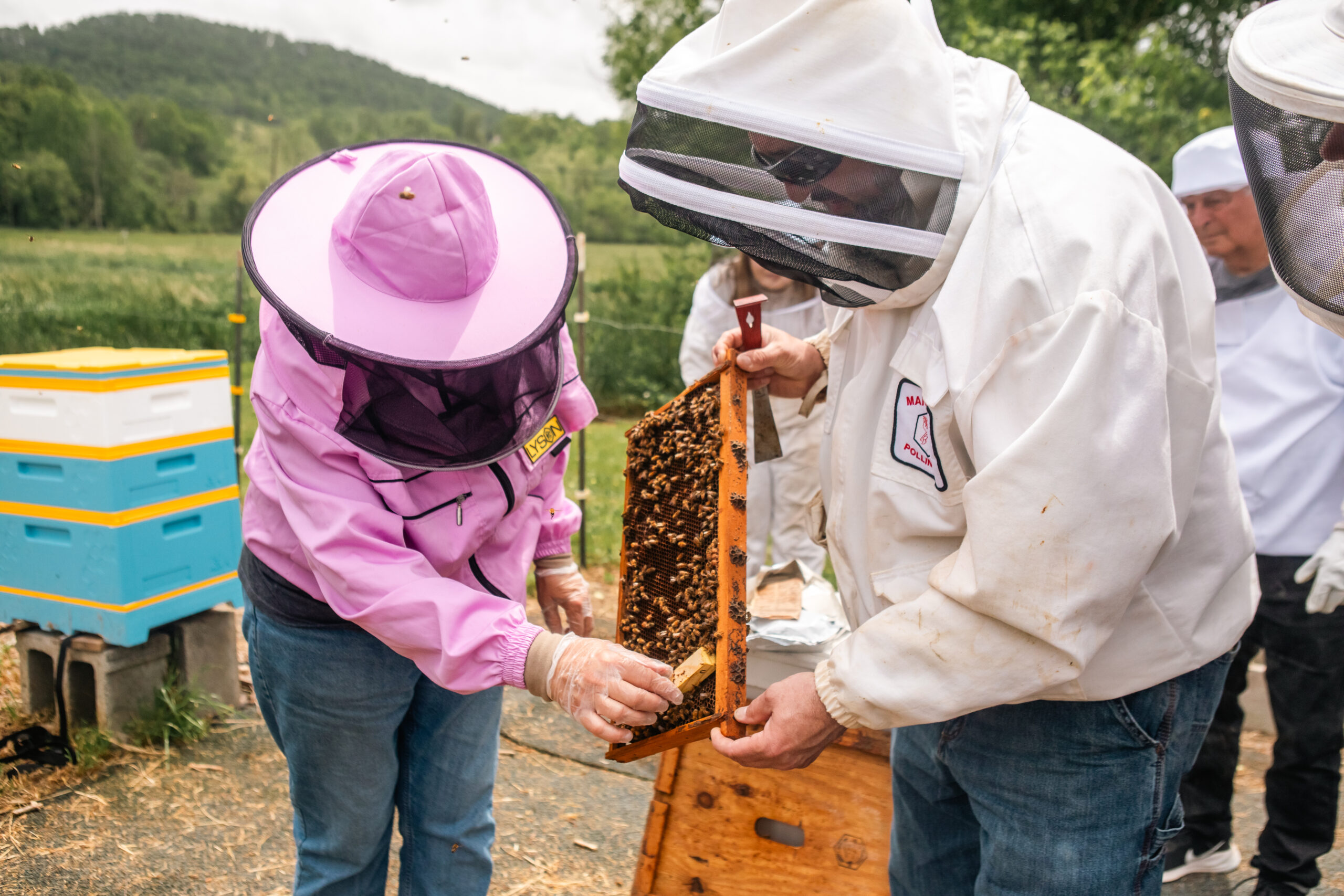
John C. Campbell Folk School Nature Studies students in the bee yard analyze the hive with Virginia’s instruction.
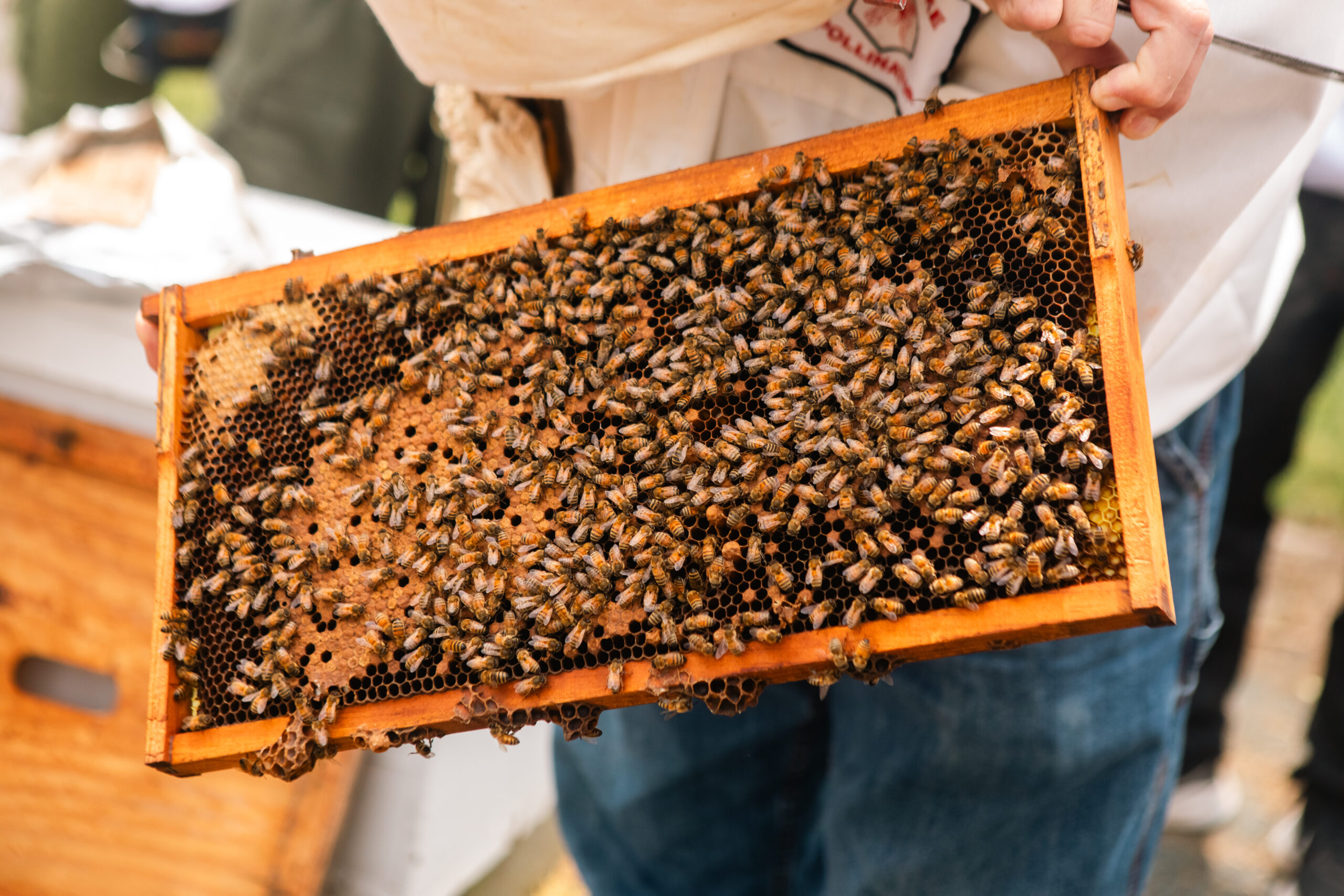
In the bee yard, frames are removed from the hive to check on the the colony, also offering an opportunity for students to learn how to locate the queen.
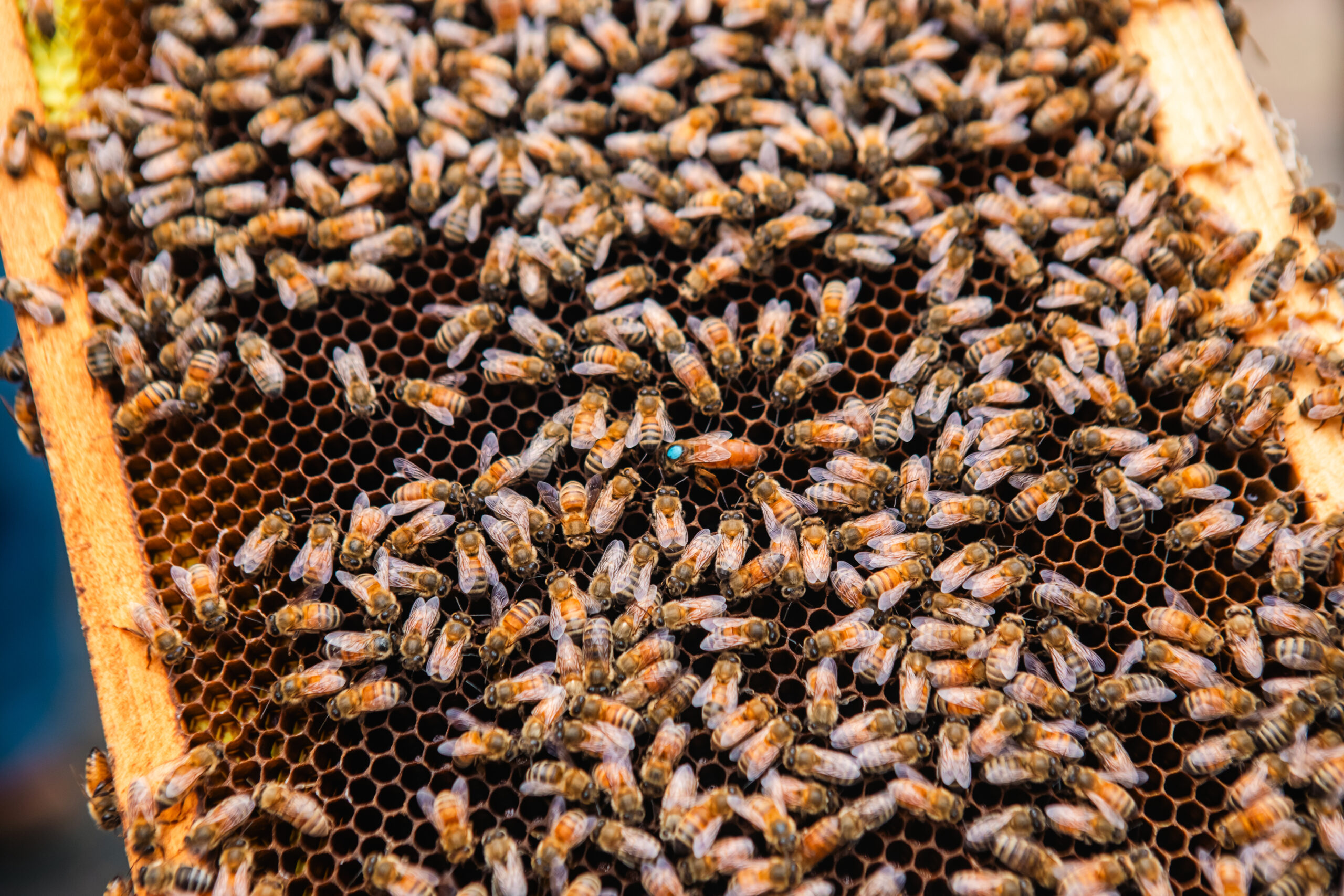
In the bee yard, one of the frames reveals the queen bee, distinguishable from the rest of the colony due to her greater size and unique coloring.
The scent of smoke and ash overtakes the air near Orchard House; the bee yard is crowded with curious students. Suited up in mesh and cotton, Webb’s pink suit stands out among the pack of white and yellow coveralls.
Bill Price has also taught at the Folk School. A sculptor, educator and metalsmith, Price decided he’d try out beekeeping.
“I’ve had an interest in learning about this subject for many years. When I saw it on this spring’s schedule, I used one of my instructor resources to sign up,” Price said. “It has been an exciting and very informative class. I’m looking forward to getting home and beginning my own set-up.”
The swarm oscillates through the air, the drone-like buzzing of 100,000 wingbeats envelops the yard. Step by step, Webb provides gentle instructions on how to open the outer cover of the hive and interact with the various components within the box.
Upon removing the cover, the second layer, the ‘super,” is revealed. This is where the colony produces and stores honey. Beneath lies the “deep super,” housing the brood in slatted racks, able to be removed for observation. Thousands of bees cover the rack walls, the smoke pots’ smoldering scent masks the alarm pheromones, calming them.
As the sun creeps lower into the sky, time in the bee yard reaches an end. Carefully, each layer of the beehive is reconstituted with gentle care. The ashy contents of the smokers are emptied, and the colony begins to settle in after their mild disruption.
Just as April concludes, as does Webb’s time as an instructor. Honey has been bottled up and beeswax candles are packed up to take home, the sweet satisfaction of a productive week seeps itself into Friday.
Her departure marks the end of an era for the Folk School’s Nature Studies program. Webb has educated the Folk School community on the intricacies of apiculture while instilling values of cooperation and environmental stewardship.
“We extend a great deal of appreciation and gratitude to Virginia, the seeds of knowledge she planted will continue to grow and blossom, synthesizing inspiration for future generations,” Chaney said. “While her presence will be missed, her impact will undoubtedly continue to resonate with the student body, pollinating the valley with her love and light.”
Because of Virginia’s legacy, beekeeping will remain among class offerings going forward, Chaney added.
Register for an upcoming Beekeeping class!
What’s the Buzz About?
August 29-September 1, 2025
Thinking about becoming a beekeeper but not sure yet? Buzz into this class that will touch on all aspects of appreciating and caring for honey bees throughout the year. Hive inspections, queen spotting, honey harvesting and more with the Folk School hives. Leave this class with a good grasp on what it takes to keep bees healthy, wealthy in honey and you, the wise!




No Comments